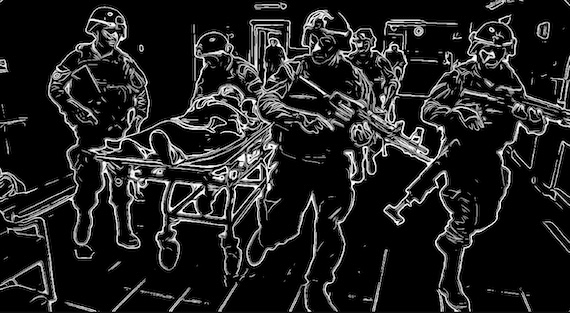Ann Arbor (Informed Comment) – Earlier this month the UN Independent International Commission of Inquiry on the Occupied Palestinian Territory issued a report demanding that Israel, in the words of Commission Chair Navi Pillar,
“Israel must immediately stop its unprecedented wanton destruction of healthcare facilities in Gaza. By targeting healthcare facilities, Israel is targeting the right to health itself with significant long-term detrimental effects on the civilian population. Children in particular have borne the brunt of these attacks, suffering both directly and indirectly from the collapse of the health system.”
The Commission did not say so, but Israeli justifications for attacking hospitals, that they are terrorism “command centers,” have repeatedly been found to be unsubstantiated.
The authors say that the Israeli assault on medical facilities has led to a collapse of the health care system in Gaza. This collapse has left chronically ill patients such as diabetics and cancer victims without treatment and led to many deaths.
The report by the numbers for the first nine months of the Israeli war on Gaza:
* Israeli forces were responsible for the deaths of 500 medical personnel.
* The Israelis attacked 113 ambulances and damaged at least 61.
* Israel conducted 498 assaults on health-care establishments within the Gaza Strip.
* These attacks resulted in the direct deaths of 747 individuals and injuries to 969 others.
* They had a negative impact on 110 facilities.
* As of mid-July, out of the 36 hospitals in Gaza, 20 were entirely out of service, and only 16 remained partially operational
*These 16 were experiencing extreme congestion and had a total bed capacity of merely 1,490 (the capacity of one fair-sized hospital of New York; this is for 2.2 million persons suffering from Israeli attacks for a year now).
* WHO documented that 78 percent of the Israeli assaults on medical facilities involved the use of military force.

“Hospital,” Digital, Midjourney / Clip2Comic, 2024
*35 percent involved the hindering of access.
*9 percent included militarized search and detention activities. These attacks were extensive and systematic.
The authors of the report assert that the Israeli military conducted air raids on hospitals, inflicting significant damage on structures and their environs, and causing numerous casualties. They encircled and laid siege to hospital grounds, stormed hospitals and apprehended medical personnel and patients, restricted the delivery of goods and medical supplies, blocked the movement of civilians in and out, issued expulsion directives but hindered safe evacuations. Additionally, Israeli security forces repeatedly impeded the access of humanitarian organizations.
* The Israeli military killed 19 members of or volunteers for the Palestine Red Crescent Society and detained and attacked many more. Medical workers expressed their belief that they had been deliberately targeted by Israeli security forces.
* Hundreds of healthcare workers, including three hospital directors and the head of an orthopedic department, as well as patients and journalists, were apprehended by Israeli security forces at Shifa’, Nasr, and Awdah hospitals during military operations. In at least two instances, senior medical staff reportedly died while in Israeli custody.
* Israel was still holding 128 healthcare workers, including four Palestine Red Crescent Society staff members, as of last July.
* Israeli officials approved the medical evacuation from Gaza through Rafah of only 5,857 of 13,872 patients who had applied for it.
* Israeli officials approved only about half of requests to depart Gaza by cancer patients.
* In July, Israel “delayed the evacuation of 150 children from the Gaza Strip in need of specialized medical treatment.”
It’s bad.


 © 2025 All Rights Reserved
© 2025 All Rights Reserved